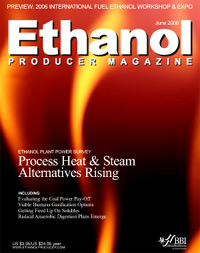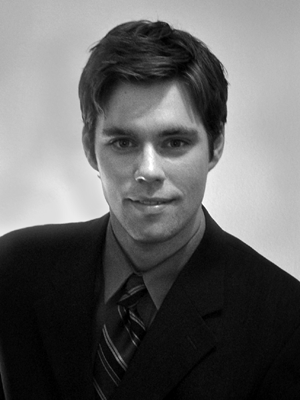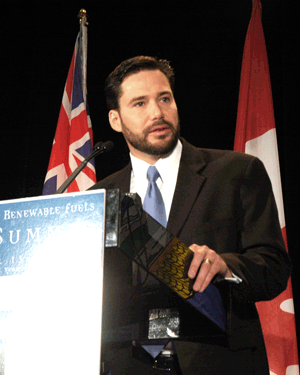June 2006
 View Full Print Edition
View Full Print EditionBusiness Briefs
Columns

The Way I See It
By Mike Bryan

A View from the Hill
By Bob Dineen

Editor's Note
By Tom Bryan

NBB In Sight
By Joe Jobe
Legal Perspective
By Terrance Costello
Talking Point
By James W. Eiler
Featured

International Fuel Ethanol Workshop & Expo 2006
By Holly Jessen
Now in its 22nd year, the International Fuel Ethanol Workshop & Expo keeps getting bigger and better with time. On June 20-23, the BBI International-organized event will do its part in "Linking Industry & Innovation" with everything from the basics to the most cutting-edge technologies.

Coal: A Fuel that Pays its Way
By Anduin Kirkbride McElroy
Ethanol production technology is continually changing—and so is the way dry-mill ethanol plants create and utilize process heat and steam. In an industry constantly seeking ways to cut costs, increase efficiencies and lock into more secure inputs, coal has become a growingly attractive option. Despite increased permitting challenges, additional transportation requisites and higher up-front expenses, more producers are turning to America's most abundant fossil fuel.

Process Heat and Steam Alternatives Rising
By Dave Nilles - Information compiled by BBI Staff
In a non-scientific survey of U.S. ethanol plants, EPM essentially reaffirmed what most industry professionals already knew about ethanol plant power sources. The U.S. ethanol industry is still heavily reliant on natural gas, but perhaps on the precipice of kicking the habit … even if coal is one of the remedies.

Pioneers Recognized, Settlers Wanted
By Ron Kotrba
Gasifying biomass materials is an increasingly popular way—conceptually and practically—for ethanol producers to hedge the high cost of natural gas, but it also offers the industry a potential bridge to cellulosic ethanol production and much more.

The Red-Hot Sands of Winnebago
By Ron Kotrba
For a year now, Corn Plus has been successfully combusting its solubles—the syrup normally added to distillers dried grains—in a fluidized bed system. EPM takes a look at the technology behind the power, and the innovative southern Minnesota ethanol plant taking advantage of this widely available energy feedstock.

Easy to Digest
By Dave Nilles
Energy independence and sustainability are the guiding principles of the EnviroPlus process. Two British Columbia-based innovators are using that credo to introduce a revolutionary and wide-ranging anaerobic digestion process to the fuel ethanol industry.

Will Denver Use it or Lose it?
By Nicholas Zeman
Metro Denver was the first area in the United States to require the use of oxygenated gasoline, when, in 1988, it mandated wintertime use of E10 to control carbon dioxide emissions. Ironically, as the area wins its longtime battle over air quality, the fate of ethanol-blended gasoline is uncertain in the Mile High City. Proposed legislation requiring 70 percent of Colorado's gasoline to be E10 six months out of the year could be the answer ethanol advocates are looking for.
A Model of Success
By Ron Kotrba and Tom Bryan
When SoyMor Biodiesel came on line with its 30 MMgy biodiesel facility in Glenville, Minn., last year, it debuted as one of the biodiesel industry's first turnkey-plant designs of its size. The project was not without its challenges, but at the end of the day, REG delivered what it promised: a state-of-the-art biodiesel facility. What the builder learned from the experience was invaluable.
Proposed Biodiesel Plant List
By Anduin Kirkbride McElroy, Holly Jessen, Nicholas Zeman, Ron Kotrba and Dave Nilles
Biodiesel Magazine's second edition of its annual Proposed Biodiesel Plant List indicates some interesting trends, most notably the obvious-growth. It's apparent this industry is itching to explode with expansion.
Man on a Mission
By Nicholas Zeman
Santa Rosa County Commissioner Robert Cole is as good with engines as he is with business and politics, and he doesn't just want northwest Florida to start using biodiesel-he wants to see the renewable fuel made there.
Making Magic Happen
By Holly Jessen
Overcoming the loss of its original European investors and dealing gracefully with the reality of having one of the world's largest biodiesel plants in it's backyard, Dakota Skies Biodiesel continues to defy the odds and work towards financial close.
Ultimate Makeover
By Anduin Kirkbride McElroy
Imagine what goes down drains at fast food restaurants, steakhouses and cafeterias in cities across America. Now imagine a process technology that converts that gunk-trap grease-into high-quality biodiesel. Industry experts have questioned the process for years. The creators of Philadelphia Fry-o-Diesel see things differently.
Contributions

Distinguishing Between ‘Bio-Ethanol' and Petroleum Ethanol
By Dr. Murry Tamers















